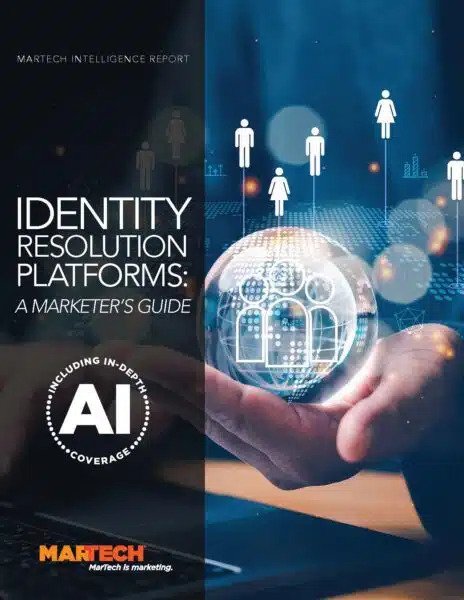24 questions to ask identity resolution vendors during a demo
Identity resolution allows marketers to more accurately target and personalize brand messages to create better customer experiences.
Identity resolution programs have become essential for brand marketers seeking to understand who their customers are, the channels they use and how they want their data protected.
Researching identity resolution vendors
Once you determine an enterprise identity resolution platform makes sense for your business, spend time researching individual vendors and their capabilities by doing the following:
- Create and prioritize a list of identity resolution use cases, from essential to unnecessary.
- Use that list as a basis for your research — many of the vendors profiled in this report also provide blogs, ebooks and interactive tools that can help.
- List of the vendors meeting your criteria, reach out to them and set a deadline for replies.
- Decide whether or not you need to engage in a formal RFI/RFP process.

Identity resolution is not only critical to marketing success but is essential for compliance with consumer privacy laws such as CCPA and GDPR. Explore the platforms essential to identity resolution in the latest edition of this MarTech Intelligence Report.
RFI/RFP process
The RFI/RFP process is an individual preference, however, be sure to give the same criteria to each vendor to facilitate comparison. The most effective RFPs only request relevant information and provide ample information about your brand and its identity resolution needs. It should reflect high-level strategic goals and KPIs. For example, mention your company’s most important KPIs and how you will evaluate the success of your efforts. Include details about timelines and the platforms in your existing martech stack.
When written properly, an RFP will facilitate the sales process and ensure everyone involved comes to a shared understanding of the purpose, requirements, scope and structure of the intended purchase. From the RFP responses, you should be able to narrow your list down to three or four platforms to demo.
Demo the platforms
Schedule demos as close together as possible for the best comparisons. Make sure all potential users are on the demo call and pay attention to the following:
- How easy is it to use?
- Does the vendor understand our business and marketing needs?
- Are they showing us our “must-have” features?
Questions for vendors
Here are some questions to ask vendors that touch on important considerations in your identity resolution search:
Data onboarding and privacy
- Does the platform support first-party data onboarding?
- Can we incorporate any of our private customer IDs into the platform?
- Do you use probabilistic, deterministic or a hybrid approach to matching?
- How do you validate the accuracy of your deterministic matches?
- What match rate can we expect, given our vertical market and database size?
- How do you comply with privacy regulations and consumer choice?
Identity graph
- Do you own or license your referential identity data?
- What are your identity data sources?
- How do you validate the quality of your identity graph?
- How much of your data is addressable?
- How is your identity graph linked to offline PII?
- Do your identity capabilities apply to non-U.S. markets?
Martech and adtech integration
- How does the platform integrate with martech platforms (i.e., CRMs, DSPs, CDPs)?
- Does the platform feature any built-in data activation capabilities (i.e., personalized email or ad campaign execution)?
- Do you have APIs available for data import/export?
- What reporting do you provide that will document the ROI from our identity efforts?
Customer support
- What kind of customer support is included — can we pick up the phone to report problems?
- Will we have a dedicated account manager and technical support?
- Do you offer a proof-of-concept to measure potential performance and scale?
- Do you provide a self-service option in which we can manage identity data?
- What kind of professional services are available — and how much do they cost?
- How does the company handle requests for product modifications?
- What new features are you considering?
- What are the long-term roadmap and launch dates?
Identity resolution platforms: A snapshot
What it is. Identity resolution is the science of connecting the growing volume of consumer identifiers to one individual as he or she interacts across channels and devices.
What the tools do. Identity resolution technology connects those identifiers to one individual. It draws this valuable data from the various channels and devices customers interact with, such as connected speakers, home management solutions, smart TVs, and wearable devices. It’s an important tool as the number of devices connected to IP networks is expected to climb to more than three times the global population by 2023, according to the Cisco Annual Internet Report.
Why it’s hot now. More people expect relevant brand experiences across each stage of their buying journeys. One-size-fits-all marketing doesn’t work; buyers know what information sellers should have and how they should use it. Also, inaccurate targeting wastes campaign spending and fails to generate results.
This is why investment in identity resolution programs is growing among brand marketers. These technologies also ensure their activities stay in line with privacy regulations.
Why we care. The most successful digital marketing strategies rely on knowing your potential customer. Knowing what they’re interested in, what they’ve purchased before — even what demographic group they belong to — is essential.
Dig deeper: What is identity resolution and how are platforms adapting to privacy changes?
Related stories